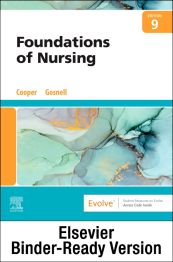Unit I: Fundamentals of Nursing
1. The Evolution of Nursing
2. Legal and Ethical Aspects of Nursing
3. Documentation
4. Communication
5. Nursing Process and Critical Thinking
6. Cultural and Ethnic Considerations
Unit II: Fundamentals of Clinical Practice
7. Asepsis and Infection Control
8. Body Mechanics and Patient Mobility
9. Hygiene and Care of the Patient’s Environment
10. Safety
11. Admission, Transfer, and Discharge
Unit III: Introduction to Nursing Interventions
12. Vital Signs
13. Physical Assessment
14. Oxygenation
15. Elimination and Gastric Intubation
16. Care of Patients Experiencing Urgent Alterations in Health
17. Dosage Calculation and Medication Administration
18. Fluids and Electrolytes
19. Nutritional Concepts and Related Therapies
20. Complementary and Alternative Therapies
21. Pain Management, Comfort, Rest, and Sleep
22. Surgical Wound Care
23. Specimen Collection and Diagnostic Testing
Unit IV: Nursing Care Across the Lifespan
24. Lifespan Development
25. Loss, Grief, Dying, and Death
26. Health Promotion and Pregnancy
27. Labor and Delivery
28. Care of the Mother and Newborn
29. Care of the High-Risk Mother, Newborn, and Family with Special Needs
30. Health Promotion for the Infant, Child, and Adolescent
31. Basic Pediatric Nursing Care
32. Care of the Child with a Physical and Mental or Cognitive Disorder
33. Health Promotion and Care of the Older Adult
Unit V: Fundamentals of Mental Health Nursing
34. Concepts of Mental Health
35. Care of the Patient with a Psychiatric Disorder
36. Care of the Patient with an Addictive Personality
Unit VI: Fundamentals of Community Health Nursing
37. Home Health Nursing
38. Long-Term Care
39. Rehabilitation Nursing
40. Hospice Care
Unit VII: From Graduate to Professional
41. Professional Roles and Leadership
Appendix A: Abbreviations
Appendix B: Laboratory Reference Values
Glossary




